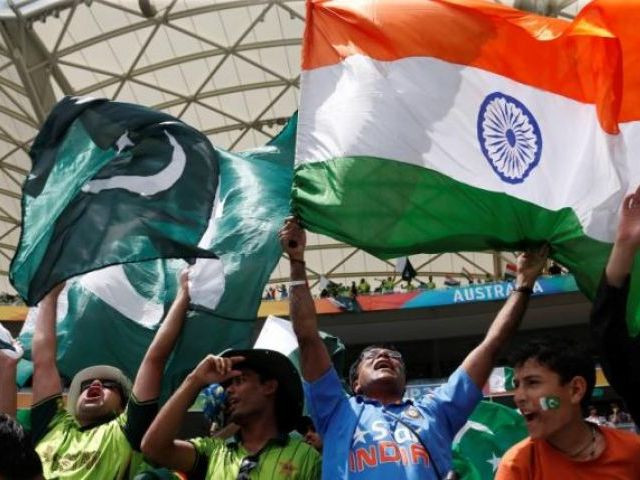The ball is in India’s court
Resumption of cricket between the two countries would undoubtedly lead to a thaw in bilateral relations

Fans of Pakistan's cricket team (L) and India's (R) cheer in the stands before Pakistan's Cricket World Cup match against India in Adelaide on February 15, 2015. PHOTO: REUTERS
Cricket is an integral part of the South Asian culture and economy. The game has been an unconventional cultural tool and has even helped normalise diplomatic relations between the two countries. Cricket matches between India and Pakistan are bigger than other similar sporting events. More than half a billion people watch these tournaments, which are very valuable commercially. In fact, the ICC has been fixing draws to ensure that India and Pakistan face each other during the group stages. It is also in the interest of the fans in both countries that the game be protected from falling prey to political tensions.
India’s refusal to play Pakistan has meant huge financial losses for the latter. The two countries had signed an agreement to play six series between 2015 and 2023. Pakistan would have been able to host at least four of these matches, enabling it to earn some $50 million only in broadcasting rights. The ICC’s decision to appoint a three-member panel to resolve issues between the PCB and the BCCI is a step in the right direction. However, it would require both the BCCI and the Indian government to look beyond politics and give the game, its players and fans on either side a chance to thrive.
PCB might have to accept FTP without India matches
In 2004, for example, the BCCI’s deliberations about whether or not to send Indian players for a Pakistan tour became meaningless when the Indian government decided that the tour would proceed for the benefit of the bilateral peace process. The series acted, in fact, as a catalyst leading to reconciliation between the two countries. The so-called Dil Jeet Lo (Win Hearts) Tour was important also because of the political preparations that led to this first sustained encounter between India and Pakistan after a fourteen year hiatus. The decision had followed a meeting between Prime Minister Atal Behari Vajpayee and External Affairs Minister Yashwant Sinha and Jagmohan Dalmiya, the BCCI chairman. The initiative resulted in both countries relaxing their tough visa regulations for each other, allowing thousands of fans to travel across the border.
A year later in 2005, when General Musharraf arrived in India, what started off as a trip to watch a game of cricket turned into a summit meeting between him and Prime Minister Manmohan Singh. The two countries promised to improve bilateral relations by enhancing trade as well as road and rail links in order to improve people-to-people contact. Although angry Indian fans ultimately marred the match itself, it did help set in motion better relations between the two governments. It was because of cricket that the two countries were able to experience a new warmth in their relations after the 2001 abortive summit between the two countries.
Similarly, the 2011 cricket World Cup also helped ease the relationship between India and Pakistan after the 2008 Mumbai attacks. Prime Minister Yousaf Raza Gilani accepted an invitation by Indian Prime Minister Manmohan Singh to watch a match with him at Mohali. Singh’s invitation had been announced during an awards function in Delhi and was endorsed by the audience. Some of India’s best and brightest supported their government’s decision by bursting into applause. The reaction provided the government with the approval it had sought and led ultimately to talks between the foreign, interior and commerce secretaries of the two countries.
President Ziaul Haq’s Jaipur visit in 1987 on the invitation of the Board of Cricket Control for India was yet another successful visit. Despite the cool reception that the Indian government gave President Zia, the visit did ultimately serve to ease tensions between the two countries. In Zia’s words after the visit, “Peace is not a button you can press.... It has to be pursued at all levels.... If you take on the level that is up to you, half the problem will be resolved.”
Indian woman on visit to attend Besakhi festival embraces Islam, marries Pakistani man
Interestingly, cricket diplomacy between India and Pakistan dates as far back as 1956-57. The cricket match in Lahore led to a temporary opening of the India-Pakistan border, enabling some six thousand people to enter Pakistan. The incident is long forgotten because it was contrary to official accounts stressing hostilities between the two nations.
Even as the India-Pakistan cricket rivalry remains fraught with geopolitical tensions the sport has helped thaw bilateral relations several times in the past. Both countries always responded positively to the so-called cricket diplomacy by welcoming the other’s overtures. Interestingly, more invitations emanated from the Indian side, which were accepted equally graciously by the Pakistani leadership. Given the importance of cricket in helping ease tensions between India and Pakistan in the past, and also India’s history of initiating peace through the game it would be a good idea for the Indian government to rethink its current policy of holding the game hostage to terrorism or conflict along the LoC. Allowing the resumption of cricket between the two countries would undoubtedly lead to a thaw in bilateral relations between the two countries. Notwithstanding the decision of the ICC panel, it is up to India to get the ball rolling on cricket. Peace is bound to follow suit.
Published in The Express Tribune, April 19th, 2018.
Like Opinion & Editorial on Facebook, follow @ETOpEd on Twitter to receive all updates on all our daily pieces.















COMMENTS
Comments are moderated and generally will be posted if they are on-topic and not abusive.
For more information, please see our Comments FAQ